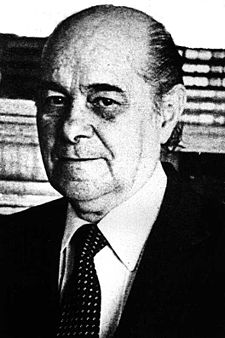By Jan Rocha
This month Brazilians remember the dramatic events of 25 years ago, when the much awaited end of the military dictatorship turned into a terrible anti-climax, as Tancredo Neves, the president elect, became ill and slowly died before he could take office.
 Tancredo’s election in January 1985 had seemed like a light at the end of the long dark tunnel of the military dictatorship. Of course, Brazilians really wanted the right to vote for their first civilian president. They’d taken to the streets in their millions to demand direct elections, but the military wanted to orchestrate their reluctant relinquishment of power in carefully stage-managed steps. They said that the next president would have to be elected, indirectly, by Congress, confident that a submissive Congress would vote for the offical candidate, their faithful supporter, the rightwing Paulo Maluf.
Tancredo’s election in January 1985 had seemed like a light at the end of the long dark tunnel of the military dictatorship. Of course, Brazilians really wanted the right to vote for their first civilian president. They’d taken to the streets in their millions to demand direct elections, but the military wanted to orchestrate their reluctant relinquishment of power in carefully stage-managed steps. They said that the next president would have to be elected, indirectly, by Congress, confident that a submissive Congress would vote for the offical candidate, their faithful supporter, the rightwing Paulo Maluf.
But the unexpected happened – Maluf was overwhelmingly defeated by the opposition candidate, the wily, experienced, veteran politician, Tancredo Neves, self-styled candidate of reconciliation.
I was there as a reporter for the Guardian. And I remember that, as we left congress after that election, exuberant crowds surged round the cars driving away. They thumped the windows and, believing that we belonged to the elite, they shouted at us Viva a Liberdade ! Out with the military!
There was a faint whiff of revolution. Change was in the air. The long night of the dictatorship was ending.
The 75 year old Tancredo Neves was the rather unlikely symbol of these huge expectations. He’d been in politics since the time of Getulio Vargas, and had patiently stitched together an alliance which reached from the far left to the moderate right. When US Secretary of State Goerge Schultz, referring to Pinochet’s Chile, told Tancredo on his pre-inauguration visit to Washington, that the moderate opposition should exclude the Marxists, Tancredo replied that while the fight to end the dictatorship was still on, it was more advisable to divide the military than the opposition.
On the eve of the inauguration, 15th March, foreign heads of states flocked into Brasilia. The country was in festive mood. Then just a few hours before the ceremony, we heard the unbelievable news:. Tancredo had collapsed and been rushed to hospital for an emergency operation. Immediately rumours started flying around about assassination attempts.
Festivity was replaced by anxiety: What now? The doctors said it was a minor intestinal problem, diverticulitis. I remembered how a few months before, at an interview at the Foreign Press Centre in Sao Paulo, Tancredo had sat there rubbing his stomach, round and round.
As Tancredo underwent surgery, forty people crowded into the operating theatre, family, friends and allies, politicians and military, all anxious to know what was really happening. Basic norms of hygiene were ignored. Poor Tancredo didn’t stand a chance.
His state worsening, he was flown to Sao Paulo and submitted to a further six operations . As the president-elect hovered between life and death, the pavement outside the hospital was transformed into a religious bazaar. Candomblé maes de santo, pajés, priests, preachers, Buddhists set up altars and shrines to pray for his recovery. But it was all to no avail.
On 21st April, Tancredo’s death was announced. I remember that it was a beautiful day as I stood among the silent, sad crowds who lined the streets to see his coffin driven by on a fire engine to the airport. As we saw the plane rise slowly into the air it seemed that it was carrying, not just Tancredo’s body, but the hopes of change, of a better Brazil.
The drama was not yet over however. In Brasilia after lying in state, the coffin was taken to the cemetery for burial. By now, it was after midnight. Both Jose Sarney, Tancredo’s vice, who had been sworn in as president when he was taken ill, and Ulisses Guimaraes, president of the Congress, who many thought should have become president, made long impassioned speeches at the graveside, like actors in a Shakespearian play.
The final act however belonged, as befitted Shakespeare, to the gravedigger, Illuminated by the TV lights, he solemnly cemented over the gravestone – but perhaps aware of Andy Warhol’s famous phrase, that everyone has his 15 minutes of fame, he did it with meticulous care. Meanwhile the nation’s leaders stood in impotent silence and the nation, mesmerized, watched every stroke of his trowel as the scene was transmitted live.
So, in one of the great ironies of Brazilian history, the first civilian president after the 21 years of dictatorship ended up being a man who had supported the military almost to the end, only jumping ship when he realised which way the wind was blowing.
Sarney, a conservative, without any of Tancredo’s political astuteness, floundered in government. The economic crisis inherited from the military produced hyperinflation, interrupted briefly by the temporary success of the Cruzado Plan, and a spiralling foreign debt. The all important land reform which Tancredo had promised was watered down. Corruption became an issue. Soon people were shouting “Sarney Out” on the streets. The uncharismatic president paved the way for the flamboyant Fernando Collor. And the rest is history.

